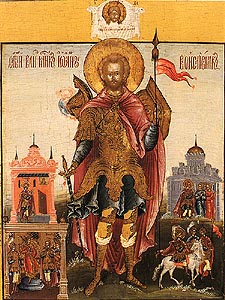Martyr John the Soldier at Constantinople

The Holy Martyr John the Soldier served in the Roman army during the reign of Emperor Julian the Apostate (361-363). He was sent with other soldiers to find and kill Christians. Although he seemed to persecute them, Saint John was actually a secret Christian, and provided much help to his fellow Christians. He freed those who had been arrested, warned others of the dangers which threatened them, and helped them to escape. Saint John displayed charity not only to Christians, but to all the destitute, and to those who needed help. He visited the sick, and consoled the grieving. When Emperor Julian the Apostate learned of the Saint's activities he arrested him and sent him to a prison in Constantinople.
In the year 363 the wicked Emperor who had denied Christ was killed in a war with the Persians. Saint John was set free and devoted his life to serving his neighbor, and living a life of holiness and purity. He reposed at an advanced age, but the exact year of his death is not known.
In time, Saint John's tomb was gradually forgotten. One day he appeared to a certain devout woman and revealed to her the details of his life. He also showed her the location of his tomb, and this became known throughout the region. His holy relics, which had the power to heal various ailments, were transferred to the church of the Apostle John the Theologian at Constantinople. Through the prayers of Saint John the Soldier, those who suffer grief and sorrow receive comfort.
In the Russian Orthodox Church, Saint John is revered as the protector of soldiers, and a great intercessor for those who experience sorrow and difficult circumstances. He is also invoked for the recovery of stolen articles and fugitive slaves.
In iconography, Saint John is usually depicted as a middle-aged man with light brown (or dark) hair, a high forehead, and a short beard. He is dressed in armor and a cloak. In some icons he may hold a cross, a scroll, or military weapons, while in others he is shown in patrician clothing, wearing a cloak over a long chiton.
Saint John the Soldier is commemorated on July 29 in Greek usage, and on July 30 in Slavic usage.
